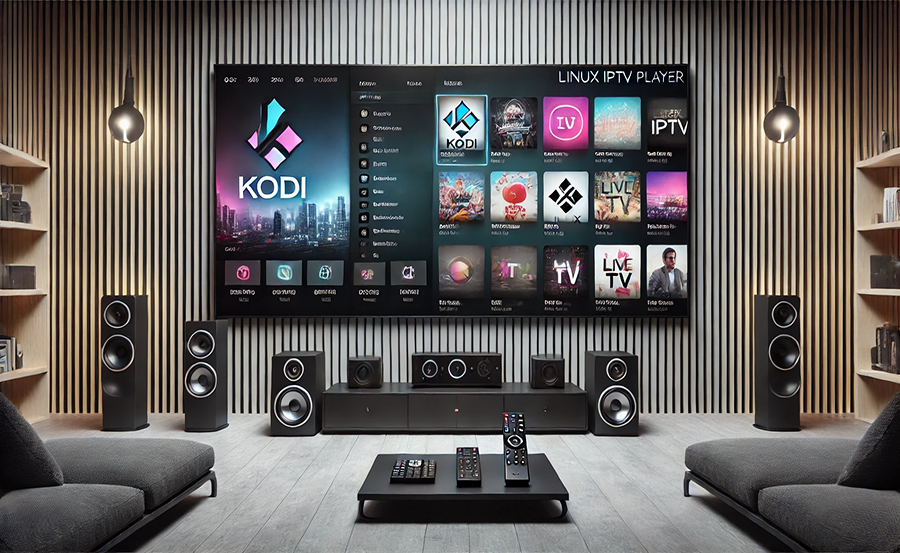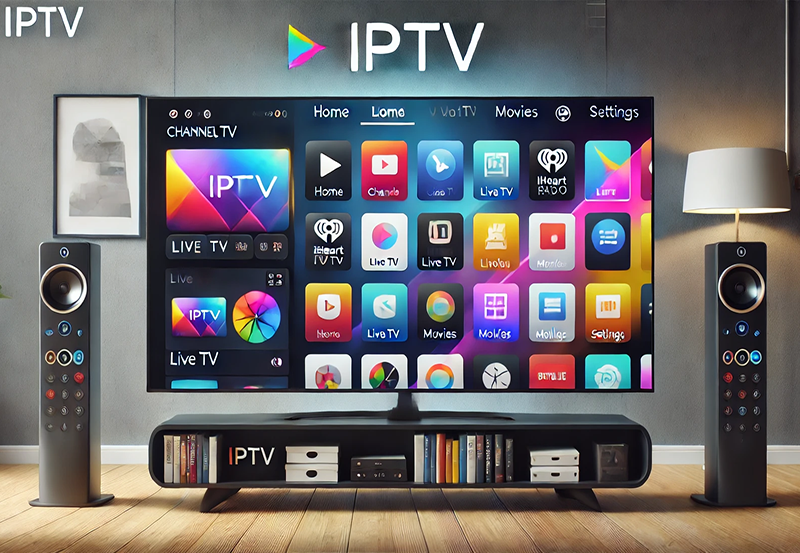In the expanding world of digital entertainment, IPTV has become a cornerstone for users seeking flexibility and variety. Choosing the right IPTV player is crucial, especially when confronted with options like Kodi and Linux. This article will guide you through understanding these platforms, exploring their features, and helping you decide which one might suit your IPTV needs best.
Understanding IPTV and Its Rise in Popularity
Internet Protocol Television, commonly known as IPTV, is a service that delivers television content via IP networks. This modern approach allows users to stream live TV content anytime, bypassing traditional broadcast methods. IPTV’s growth aligns with the increasing demand for on-demand and live streaming services. It’s no surprise, then, that platforms like Roku, Android, and smart TVs have embraced IPTV applications.
Many users now find themselves exploring IPTV options to complement their Live TV streaming experiences. This shift represents a broader trend towards customized viewing habits, enhancing user independence and personal viewing schedules.
Pro Suggestion:
Access global live TV with Calma Hub IPTV, designed for seamless streaming across all your favorite devices.
Live TV Streaming: Meeting User Demand
The rise of live TV streaming has set new standards for television consumption. Unlike traditional cable services, live streaming provides greater freedom, allowing viewers to watch television programs without strict schedules. Consumers want more control, and live TV streaming delivers just that with pause, rewind, and recording options.
This demand for live TV streaming has pushed IPTV services to evolve rapidly, adding diverse functionalities and extended content libraries to cater to varying user preferences.
The Core Features of Kodi
Kodi, originally known as XBMC, is an open-source media player that offers a wide array of add-ons to enhance functionality. Its versatility extends to playing local media, streaming IPTV content, and accessing third-party apps. But what makes Kodi a popular choice among enthusiasts?
Firstly, Kodi’s interface is user-friendly, appealing to both tech-savvy users and novices alike. Its robust add-on ecosystem allows users to customize their viewing experience, providing access to a wealth of content from diverse sources.
Exploring Kodi’s Plugin Ecosystem
Kodi’s plugin ecosystem is one of its most attractive features. Users can select from numerous plugins to expand their media library, access IPTV channels, or even integrate other streaming services. This ability to tailor the experience is significant, making Kodi far more than a simple media player. It has evolved into an entertainment hub.
Another key advantage is its constant updates. Kodi’s active community contributes plugins that enhance functionality, ensuring users always have access to the latest and greatest content options.
A Closer Look at Linux-Based IPTV Solutions
Linux is another powerhouse platform known for its stability and performance. Linux-based IPTV solutions offer considerable benefits, particularly for users comfortable with its command-line interface and system configurability. However, it’s not all smooth sailing for everyone.
While Linux’s performance is hard to beat, the learning curve can be steep for those unfamiliar with its environment. Despite this, its flexibility remains unmatched, allowing tech enthusiasts to customize IPTV solutions to their liking.
The Advantages of Linux’s Flexibility
The beauty of Linux lies in its flexibility. Users can build a completely customized IPTV player from the ground up. This is perfect for those who want full control over their media playback and IPTV configuration. Additionally, Linux-based systems are often more secure and stable due to their open-source nature.
However, to tap into this potential, users must possess a certain level of technical expertise or a willingness to learn. For some, this is seen as an exciting challenge, contributing to the platform’s high level of user satisfaction.
Choosing Between Kodi and Linux for IPTV
Deciding between Kodi and Linux depends on your needs and technical skills. If you seek simplicity and a vast library of plugins, Kodi might be your solution. On the other hand, if customization and system flexibility are your priorities, Linux could be your best bet.
Both platforms offer unique advantages, but it is vital to evaluate what fits best with your existing technology ecosystem and personal entertainment goals before making a decision.
The Expert’s Guide to IPTV Enjoyment
When it comes to fully enjoying IPTV, understanding the capabilities and limitations of your chosen platform is pivotal. Here are some vital tips to maximize your IPTV experience:
- Know Your Network: A stable internet connection is critical. Consider upgrading to higher bandwidths if necessary to prevent buffering during live TV streaming.
- Utilize VPNs: For added security and access to geographically restricted content, a VPN can prove beneficial.
- Experiment with Add-ons: Especially on Kodi, using add-ons can greatly enhance your IPTV library.
- Regular Updates: Keep your software and plugins updated to benefit from the latest features and security patches.
Challenges and Considerations
Venturing into IPTV isn’t without challenges. Navigating around geo-restrictions, understanding legal implications of certain content, and dealing with potential technical issues can be daunting.
It’s essential to consider these factors as part of your IPTV setup. Prioritize legitimate content sources and be mindful of the privacy and legal guidelines governing IPTV use in your region.
Crafting Your IPTV Setup: Practical Advice
Let’s discuss some practical advice for those setting up an IPTV player. Regardless of the platform, there are a few universal considerations to ensure a smooth experience.
Choose the Right Hardware: The capabilities of your chosen platform correlate directly to the hardware you use. Ensure your device supports the software requirements and can handle streaming without hiccups.
Optimizing for IPTV on Roku
Roku is a popular choice for streaming, but setting it up for IPTV can require some additional steps. While Roku doesn’t natively support IPTV apps, there are workarounds that can facilitate this setup.
Utilizing apps like Plex or Kodi through casting, or setting up a private IPTV channel, enhances the versatility of IPTV on Roku, ensuring you can access your desired content smoothly.
Secure the Future: Updates and Maintenance
Regular updates are crucial for any IPTV setup. Whether you lean towards Kodi or Linux, staying updated ensures optimal performance and security. It may seem trivial, but missing an update could lead to significant security vulnerabilities.
Users should consistently check for software updates and apply patches promptly to maintain a secure and efficient IPTV environment.
End Note: Your Personalized IPTV Journey
Choosing the right IPTV player between Kodi and Linux depends largely on individual needs and technical comfort levels. Each platform offers substantial benefits, suited to varying user preferences. Embark on your IPTV journey with confidence, armed with the knowledge you need to create a viewing experience tailored specifically for you.
Remember, the process is as much about exploration as it is about consumption. Don’t hesitate to experiment with different setups to discover what truly enhances your entertainment journey.
Frequently Asked Questions

What is the difference between IPTV and traditional TV?
IPTV delivers content via internet protocols, allowing for on-demand and live streaming, unlike traditional TV which relies on broadcast signals. This method enables greater interactivity and control over viewing schedules.
Can I use Kodi on Roku to stream IPTV?
Roku does not directly support Kodi. However, you can use workaround methods like screen mirroring or casting to stream IPTV on Roku using Kodi.
Is Linux a good option for IPTV beginners?
Linux can be challenging for beginners due to its technical nature. However, for those willing to learn, it offers unmatched customization and stability for IPTV services.
How can I ensure my IPTV connection remains stable?
Maintaining a stable IPTV connection involves using high-speed internet, minimizing network congestion, utilizing modern hardware, and regularly checking for software updates to optimize performance.
Does IPTV usage come with legal risks?
Yes, some IPTV services might operate in legal gray areas, particularly if they provide pirated content. It’s important to use reputable providers and understand the legal guidelines related to streaming in your area.
What are the top benefits of IPTV?
IPTV provides flexibility, allowing viewers to watch content on-demand, access a broad range of channels, and enjoy enhanced interactive features, all with the convenience of internet delivery.
TiviMate 2024: Complete Guide to IPTV Excellence





